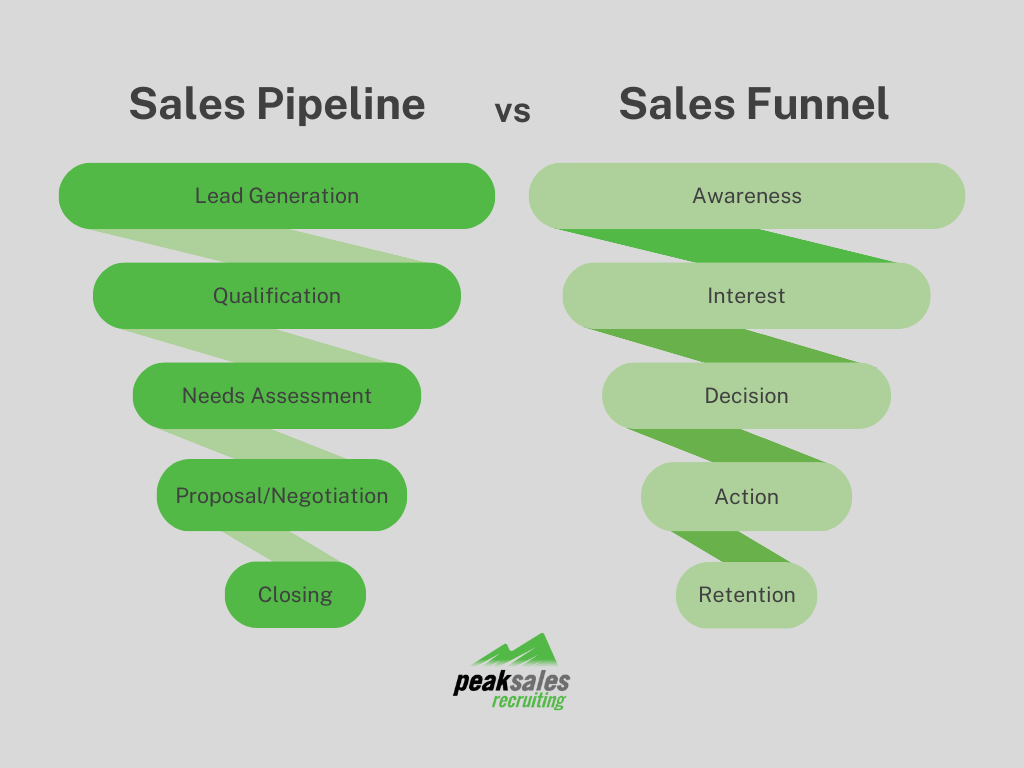Have you ever confused the terms “sales pipeline” and “sales funnel”? If so, you’re not alone. These are both essential concepts in sales, but they approach the customer journey from different perspectives.
Understanding the difference between the two and how they work together can lead to sales success. This guide will help clear any confusion and provide insights on effectively leveraging both concepts.
What is a Sales Funnel?
Imagine a wide funnel at the top, narrowing as it goes down. That’s the sales funnel in action. It represents the buyer’s journey, visualizing how potential customers discover your brand, move through various stages of consideration, and, ideally, convert into loyal customers.
Why is a Sales Funnel Important?
The sales funnel is your window into the customer’s mind. It reveals:
- Awareness: How many potential customers know about your brand?
- Engagement: How many show interest and move further down the funnel?
- Conversion Rates: Where are potential customers dropping off?
By understanding these metrics, you can refine your marketing efforts to attract more leads, nurture them effectively, and ultimately boost sales.
Read “9 Sales KPIs Every Rep Should Track for Success” to stay ahead of the competition.
What is a Sales Pipeline?
Now, switch to the seller’s side. The sales pipeline focuses on your sales team’s specific actions to convert leads into customers. It’s a structured roadmap, typically divided into stages like lead qualification, proposal, and closing.
Why is a Sales Pipeline Important?
The sales pipeline keeps your sales team on track. It helps them:
- Stay Organized: Track the progress of each deal and manage workload efficiently.
- Forecast Revenue: Estimate future sales based on the pipeline’s value and stage distribution.
- Identify Bottlenecks: Pinpoint stages where deals get stuck, allowing you to improve your sales process.
Sales Pipeline vs Funnel: Key Differences

Sales pipeline and sales funnel are commonly used terms in the sales world. Although they may seem similar, they are two distinct concepts, and sales professionals need to understand their differences.
The sales pipeline refers to the different stages a sales representative goes through to turn a potential customer into an actual customer. On the other hand, the sales funnel refers to the stages a prospective customer goes through before making a purchase. Both these concepts are critical for managing and optimizing the sales process.
The funnel tracks the buyer’s journey, while the pipeline tracks the seller’s actions. The funnel provides a broad view of the sales journey, while the pipeline is a detailed, stage-by-stage process. The funnel measures conversion rates, while the pipeline tracks deal value and activity.
In short, the funnel tells you who is moving through your sales journey, while the pipeline tells you how your sales team converts them.
Want to close more deals? Read our article “10 Types of Sales Calls: From Cold to Closed-Won.”
The 6 Stages of a Sales Pipeline
Below are six standard stages of a typical sales pipeline:
- Lead Generation: Identifying and attracting potential customers.
- Qualification: Assessing if a lead is a good fit for your product or service.
- Needs Assessment: Understanding the lead’s specific needs and challenges.
- Proposal: Presenting your solution and its value proposition.
- Negotiation: Discussing terms and pricing.
- Closing: Securing the sale and converting the lead into a customer.
The 5 Stages of a Sales Funnel
Here are five common stages of a typical sales funnel:
- Awareness: Potential customers become aware of your brand and its offerings.
- Interest: They show interest in learning more about your product or service.
- Decision: They evaluate your options and compare you to competitors.
- Action: They make the purchase decision.
- Retention: You develop a long-term relationship with the customer to encourage repeat business.
The Bottom Line
By understanding how sales funnels and pipelines work together, you can attract more leads, convert them into customers, and maximize revenue. This knowledge will help you craft targeted marketing campaigns, refine your sales process, and optimize your team’s efforts to achieve your business goals.
Need help recruiting new sales team leaders? Let us assist you; learn more here.



